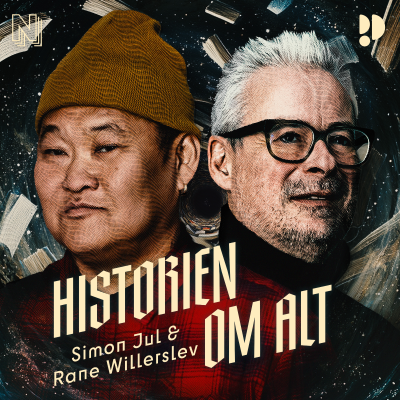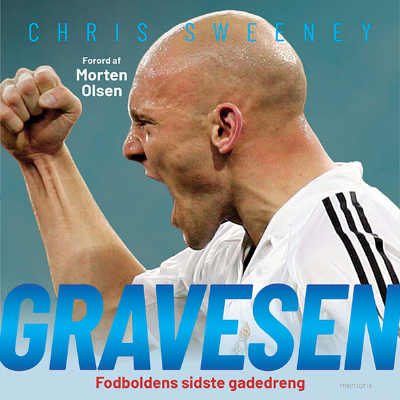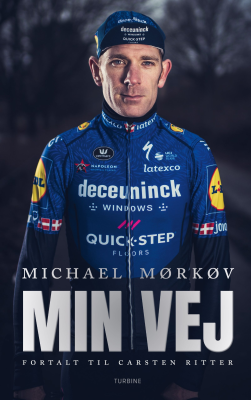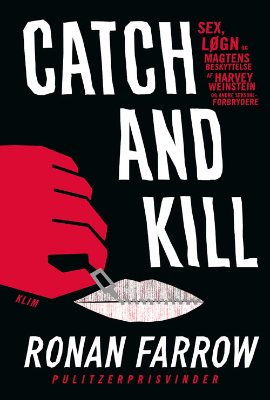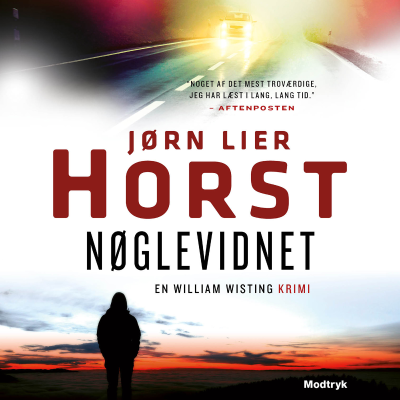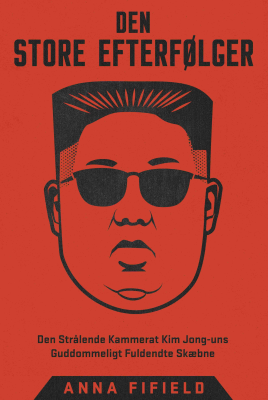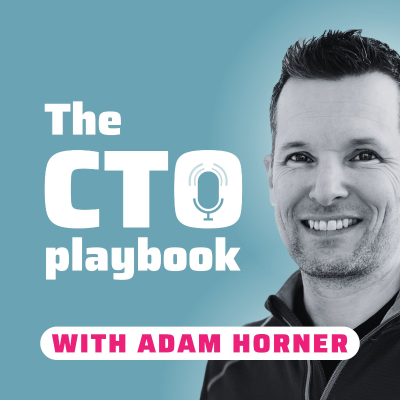
The CTO Playbook
Podcast af Adam Horner
Prøv gratis i 7 dage
99 kr. / måned efter prøveperiode.Ingen binding.

Mere end 1 million lyttere
Du vil elske Podimo, og du er ikke alene
Rated 4.7 in the App Store
Læs mere The CTO Playbook
Join Adam Horner, a CTO with over 30 years in the tech industry, on The CTO Playbook — the podcast dedicated to helping CTOs excel. Perfect for CTOs and tech leaders navigating the complexities of their roles, each episode offers clear insights, innovative strategies, and practical advice from top leaders in tech. With Adam’s extensive experience mentoring engineers and tech leaders, and over a decade as a CTO, you’ll gain the tools and knowledge to build and refine your own CTO playbook. Whether you're tackling complex projects, fostering innovation, leading teams, or shaping your company's tech strategy, this podcast is your go-to resource. Adam’s journey from engineer to strategic CTO was challenging. He learned through the school of hard knocks, making avoidable mistakes and facing countless challenges. Often out of his comfort zone and wishing for more guidance, he created this podcast to provide the support and advice he once lacked. Tune in for engaging interviews, leadership tips, and the latest in technology strategy. Each episode is designed to help you lead with confidence and level up as a CTO. Listen now to start your journey with The CTO Playbook and build your own playbook to excel in your role.
Alle episoder
55 episoderJoin The CTO Playbook Slack Community [https://docs.google.com/forms/d/e/1FAIpQLSew8bLgh5Jq0f2SgbWehRviJnQogAfo8CRW6_OQVzUXsIWnRA/viewform] to connect with other CTOs! Are you managing your individual contributors in a way that fuels growth, performance, and alignment? In this episode, I’m talking with Faris Aranki, founder of Shiageto Consulting, about leading individual contributors through regular one-on-one meetings. Faris brings a wealth of experience from his career in strategy consulting and leadership coaching. We dive into a proven system for structuring these meetings to keep performance management simple, effective, and human-centered. We explore how to align individual performance with company goals, why weekly check-ins are crucial, and how to integrate these meetings into your larger performance frameworks. Faris also shares how building rapport and listening actively can lead to stronger relationships with your team, ensuring that growth is both continuous and aligned with the broader mission. You’ll Learn: * The real reason weekly one-on-ones are critical for individual contributor success * Why a rolling agenda document is your most powerful tool in building trust and accountability * How to use silence strategically in one-on-one meetings to encourage deeper conversation * The quiet damage of neglecting active listening in engineering teams * What it feels like to lead with empathy and get results without micromanaging * How to align individual performance with company goals through simple, structured conversations * The surprising link between personal development plans and long-term organizational success * Why you should avoid status updates in one-on-ones and focus on personal growth * How asking the right questions based on learning styles can level up your coaching approach Timestamps: [00:00] Introduction [06:30] The impact of the rolling agenda document on trust and accountability [08:00] How to structure one-on-ones to focus on personal growth and alignment [10:15] The role of silence in encouraging deeper conversations [12:00] How active listening can strengthen team communication and trust [16:30] Using the VARK model to tailor coaching to individual learning styles [19:10] How to integrate weekly, quarterly, and annual meetings into a performance management system [22:50] The benefits of focusing on experience over output in one-on-one meetings [25:00] Handling performance improvement plans and documentation for legal clarity [28:30] How to use one-on-ones to build influence and promote personal development [32:00] The importance of aligning individual goals with company objectives [34:50] Best practices for conducting quarterly and annual performance reviews Resources Mentioned: The Five Dysfunctions of a Team by Patrick Lencioni | Book [https://www.amazon.com/Five-Dysfunctions-Team-Leadership-Patrick/dp/0787960756] or Audiobook [https://www.audible.ca/pd/The-Five-Dysfunctions-of-a-Team-Audiobook/B071S17ZMN?eac_link=3kCBRUvMjPum&ref=web_search_eac_asin_1&eac_selected_type=asin&eac_selected=B071S17ZMN&qid=Y6oJxKNtVz&eac_id=131-2763229-7835508_Y6oJxKNtVz&sr=1-1] Leaders Eat Last by Simon Sinek | Book [https://www.amazon.com/Leaders-Eat-Last-Together-Work/dp/1591848016] or Audiobook [https://www.amazon.com/Leaders-Eat-Last-Together-Others/dp/B084D1NZGL/ref=tmm_aud_swatch_0] Hanlon's Razor | Principle [https://en.wikipedia.org/wiki/Hanlon%27s_razor] Movie: Moneyball You can connect with Faris on LinkedIn [https://www.linkedin.com/in/farisaranki/] or take the Shiageto effectiveness assessment here [https://www.shiageto.com/iqeqfq]. Find more from Adam on LinkedIn [https://www.linkedin.com/in/adamhorner/] and YouTube [https://www.youtube.com/channel/UCGIBKIGGjsew2vGL3zVJQvw], and check out Adam's CTO coaching company Synova Tech [https://www.synova.tech/].
Join The CTO Playbook Slack Community [https://docs.google.com/forms/d/e/1FAIpQLSew8bLgh5Jq0f2SgbWehRviJnQogAfo8CRW6_OQVzUXsIWnRA/viewform] to connect with other CTOs! Are you managing individual contributors the best way possible? In this episode, I sit down with Peter Wong, a seasoned CTO, to discuss how to lead individual contributors effectively with a structured and personalized approach. You’ll hear how weekly one-on-one meetings, a simple but powerful rolling agenda, and understanding how each person learns can take performance management from stressful to seamless. We dive into how this method helps you align your team with company goals, nurture personal growth, and create trust—ensuring the continuous development of your engineering team, one conversation at a time. This approach ensures clarity and consistency, allowing your team to thrive. You’ll Learn: * Why weekly one-on-one meetings are more powerful than lengthier sessions * The real reason a rolling agenda can transform your leadership approach * How to foster trust and build rapport by simply listening more than speaking * What happens when you tailor your questions to how each person learns * The surprising link between performance management and building personal connections * Why writing things down in meetings isn’t just a formality—it’s a trust-builder * The quiet damage of skipping regular check-ins with your team * What it feels like to have an annual review with zero surprises * The key to making performance feedback feel like a natural progression * How to use small actions like weekly meetings to drive big results over time Timestamps: [00:00] Introduction [05:25] How to build trust through active listening in one-on-ones [06:45] Tailoring questions to different learning styles for better coaching [08:05] The value of writing things down in meetings [09:20] Structuring one-on-one meetings for maximum impact [11:15] Keeping feedback focused on personal growth [12:40] The power of regular check-ins for performance momentum [14:05] Linking weekly meetings to quarterly and annual reviews [15:35] Using the VARK model to understand how your team learns [17:10] Handling performance improvement plans effectively [21:00] Simplifying annual reviews with structured feedback [22:45] Making performance reviews a natural progression [28:05] The role of a structured approach in leadership [30:10] Why a rolling agenda document is a game-changer You can connect with Peter and learn more about his work through his LinkedIn [http://www.linkedin.com/in/peteryhwong] and website [https://www.peterwong.org]. Find more from Adam on LinkedIn [https://www.linkedin.com/in/adamhorner/] and YouTube [https://www.youtube.com/channel/UCGIBKIGGjsew2vGL3zVJQvw], and check out Adam's CTO coaching company Synova Tech [https://www.synova.tech/].
Join The CTO Playbook Slack Community [https://docs.google.com/forms/d/e/1FAIpQLSew8bLgh5Jq0f2SgbWehRviJnQogAfo8CRW6_OQVzUXsIWnRA/viewform] to connect with other CTOs! Are you getting the most out of your individual contributors? In this episode, I sit down with Matan Kubovsky to dive into the art of managing individual contributors through weekly one-on-one meetings. Matan shares his experience and a proven system for leading teams with consistency, clarity, and alignment. This method isn’t just about project updates—it’s about shaping growth and connecting each person’s role to the broader organizational mission. We cover how to structure meetings, build trust, and set the right cadence to keep momentum going. Matan also discusses how to track progress with a rolling agenda and how to use the VARK learning model to tailor coaching to the team’s learning styles. Whether leading a small team or guiding team leads, this episode is packed with actionable insights to make performance management smoother and more effective. You’ll Learn: * The real reason weekly one-on-ones are the most powerful tool for individual contributor growth * What happens when you set the right cadence for meetings and stick to it * The surprising link between active listening and building trust with your team * Why silence in meetings can be your secret weapon to get more from your team * How to use the VARK model to tailor coaching and accelerate learning * The quiet damage of losing momentum by meeting less than once a week * What it feels like to lead with clarity by aligning individual performance with company goals * Why recording your one-on-one meetings can build confidence and create valuable evidence * The key difference between a mission statement and a personal development plan * How to avoid the performance review “surprise” by keeping a rolling agenda document Timestamps: [00:00] Introduction [06:30] Why many engineering teams lack performance management skills [08:05] The problem with annual performance reviews [09:35] How feedback frequency impacts team performance [11:10] The Start/Stop/Continue framework explained [13:25] The need for weekly one-on-one meetings with individual contributors [16:05] Why silence in meetings can drive more meaningful conversations [19:15] How to help engineers improve their listening and communication skills [21:40] The importance of shifting focus from output to experience in meetings [25:00] Why keeping a rolling agenda document is essential for tracking progress [30:20] How to structure quarterly reviews and set goals for the next quarter Resources Mentioned: McKinsey Research | Website [https://www.mckinsey.com/] You can connect with Matan through his Linkedin [https://www.linkedin.com/in/matan-kubovsky/] or schedule a meeting to learn more here [https://www.matankconsulting.com/]. Find more from Adam on LinkedIn [https://www.linkedin.com/in/adamhorner/] and YouTube [https://www.youtube.com/channel/UCGIBKIGGjsew2vGL3zVJQvw], and check out Adam's CTO coaching company Synova Tech [https://www.synova.tech/].
Join The CTO Playbook Slack Community [https://docs.google.com/forms/d/e/1FAIpQLSew8bLgh5Jq0f2SgbWehRviJnQogAfo8CRW6_OQVzUXsIWnRA/viewform] to connect with other CTOs! Being busy isn’t your problem—being absent is. In this special episode, Adam dives into the hidden cost of not showing up—at work, at home, and especially as a leader. If you’ve ever coasted through a Zoom call, half-listened to a teammate, or checked your phone while spending time with your kids, this one will hit hard. Adam pulls back the curtain on what it really means to lead with presence—not perfection—and how that simple act can radically transform trust, engagement, and team performance. You’ll hear personal stories, hard-won lessons, and five tactical steps to build a leadership style grounded in consistency and connection. Whether you're burned out or just trying to level up, this episode delivers the wake-up call (and the playbook) you didn’t know you needed. You’ll Learn: * How showing up with full presence activates trust, connection, and influence * Why “being there” isn’t the same as actually being present * What distracted leadership signals to your team—and how it erodes performance * How to create friction against distractions and train consistent focus * Why celebration is a strategic act—not a soft one * How to structure 1:1s that deepen trust and engagement * What a simple “thank you” does to long-term team motivation * Why consistency beats charisma in high-stakes leadership * How to audit your calendar for high-impact presence opportunities * What missed moments teach us about recommitment and integrity Timestamps: [00:00] Introduction [02:20] Why presence matters more than perfection [03:08] The real meaning of “showing up” [03:47] Story: daughter calls out her dad for not watching [04:29] Story: child notices when phone is put away [05:07] Why absence creates disconnection—even in the same room [05:35] What presence looks like in a professional setting [06:10] How presence builds or destroys trust [06:45] Story: transforming a demoralized team through consistency [07:56] The role of showing up in changing team culture [08:25] Why presence includes celebrating wins [08:58] Story: the 15-minute celebration that stuck [09:50] Why being noticed beats being rewarded [10:36] What makes consistency so difficult [11:05] The support systems that enable presence [12:02] Step 1: know where presence matters most [12:22] Step 2: create friction for distraction [12:45] Step 3: celebrate outcomes deliberately [13:04] Step 4: practice active presence in 1:1s [13:30] Step 5: acknowledge your misses and recommit Resources Mentioned: The CTO Playbook Platform | Website [https://www.thectoplaybook.com/] Find more from Adam on LinkedIn [https://www.linkedin.com/in/adamhorner/] and YouTube [https://www.youtube.com/channel/UCGIBKIGGjsew2vGL3zVJQvw], and check out Adam's CTO coaching company Synova Tech [https://www.synova.tech/].
Join The CTO Playbook Slack Community [https://docs.google.com/forms/d/e/1FAIpQLSew8bLgh5Jq0f2SgbWehRviJnQogAfo8CRW6_OQVzUXsIWnRA/viewform] to connect with other CTOs! You’re leading everyone else—but are you quietly abandoning yourself? This episode features executive coach and former engineer Natalya Tarasova, who brings a rare blend of technical credibility, Eastern philosophy, and mountaineering metaphors to the world of tech leadership. With a background in physics, machine learning, and organizational coaching, Natalya doesn’t just talk about change—she’s lived it through multiple career pivots and international moves. Her perspective is especially powerful for high-performing CTOs who’ve built their careers on delivering results but feel disconnected from their own needs. In this conversation, Adam and Natalya break down why so many senior tech leaders are brilliant at leading others but terrible at leading themselves. You’ll learn how to recognize when you’ve put yourself last for too long, how to approach inner transformation with the same strategy you’d use for scaling a system, and why burnout often hides behind high output. Expect unconventional insights on emotional regulation, breathing as a leadership tool, the myth of waiting until you’re “ready,” and how to rewire your mental architecture for sustainable impact. This episode is a must-listen if you’re ready to stop sprinting and start leading from stillness. You’ll Learn: * How high performers unknowingly sabotage themselves by avoiding stillness * Why “putting yourself first” is essential—not selfish—for sustainable leadership * How to use mountaineering metaphors to map out complex personal growth * What breathing techniques reveal about nervous system regulation under stress * How to shift from reactive change to intentional transformation * Why visualizing your “inner mountain” creates clarity in career transitions * How to identify the emotional weight you're carrying that’s slowing your progress * What Eastern philosophy teaches about integrating body, mind, and identity * How to coach others more effectively by first learning to coach yourself * Why most CTOs delay change until they feel “ready”—and why that’s a trap Timestamps: [00:00] Introduction [04:58] What constant career change reveals about personal adaptability [06:36] The hidden cost of being too externally focused [09:08] Are you a victim of change or a driver of it [10:18] How to take control of your state and response [12:30] Why CTOs say they don’t know how to put themselves first [14:56] Using a mountain metaphor to visualize growth [17:05] Why high achievers struggle to slow down [18:16] The role of stillness in understanding motion [20:12] Why breathwork is the fastest reset for high performers [23:12] How to prepare for the next phase of your leadership [25:11] How to know when it’s time to move [27:09] What leaders need to leave behind to grow [28:12] Change is not linear—it’s a spiral [30:01] What most high performers miss when working on themselves [31:07] Why change starts with rewiring your identity [33:00] Giving yourself permission to fail and learn [35:03] Why emotional empathy can’t be intellectualized [37:06] How embodied wisdom changes your leadership presence [39:04] The hidden power of integrating personal and professional growth [41:05] How self-leadership creates ripple effects across teams [42:12] The 4-step change framework for CTOs [44:05] Why timing your next change is a skill, not luck You can connect with Natalya on LinkedIn [https://www.linkedin.com/in/natalyatarasova/] and learn more about her company, Tarasova Coaching on its website. [https://www.tarasovacoaching.com] Find more from Adam on LinkedIn [https://www.linkedin.com/in/adamhorner/] and YouTube [https://www.youtube.com/channel/UCGIBKIGGjsew2vGL3zVJQvw], and check out Adam's CTO coaching company Synova Tech [https://www.synova.tech/].

Rated 4.7 in the App Store
Prøv gratis i 7 dage
99 kr. / måned efter prøveperiode.Ingen binding.
Eksklusive podcasts
Uden reklamer
Gratis podcasts
Lydbøger
20 timer / måned








